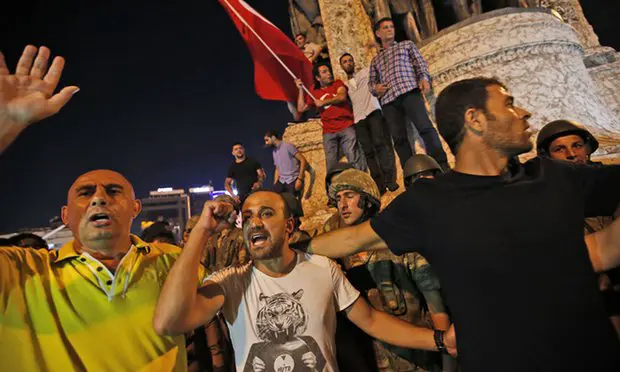Turkey may be blocking or slowing access to social media networks amid an attempted military coup, although there are conflicting reports emerging from a country that’s been described as a “bastion of internet censorship” by the Electronic Frontier Foundation.
Turkey Blocks, an organization that monitors internet censorship in the country,tweeted on Friday evening that Facebook, Twitter, and YouTube were being blocked, but that Vimeo and Instagram were still functioning.
“Our data indicated a 2 hour period of social media throttling but no evidence of a full internet blackout in #Turkey,” the group subsequently tweeted. Facebook and Twitter users confirmed the service had been inaccessible but had since returned, albeit slowly.
Internet censorship in Turkey typically occurs when the government orders internet service providers to block access to certain domains, according to Deji Olukotun of Access Now, a digital rights advocacy group. Olukotun confirmed to the Guardian that social media sites have been subject to “intentional disruptions”. He added that technologists could distinguish between outages due to such “manipulation” and outages due to a surges in use that may occur during crises.
Gustaf Björksten, chief technologist for Access Now, cautioned that his organization did not yet have “conclusive results” or proof of government censorship.
“As governments and the carriers get more skilled at implementing network interference, they move toward tactics that are more difficult to prove ... the picture in Turkey right now is far from clear to us,” he said.
“We have no reason to think we’ve been fully blocked in #Turkey, but we suspect there is an intentional slowing of our traffic in country,” Twitter said via its @policy account.
A spokesperson for YouTube denied that its service had been impacted, stating: “We are aware of reports that YouTube is down in Turkey, however, systems seem to be functioning normally.”
Facebook declined to comment, but it is understood that there may have been some brief outages.
Some users in Turkey appear to be accessing Facebook Live and Twitter, but it is possible they are using virtual private networks (VPNs) to get around a government-imposed block.
Other social networks appear to be unaffected, so far. Spokespeople for Periscope, the livestreaming video app owned by Twitter, and WhatsApp, a messaging app owned by Facebook, said their services were live.
Turkey has a long history of internet censorship, including three earlier blockages in 2016 alone, according to the digital rights advocacy group Access Now. The most recent outage occurred following the terrorist attack on Ataturk Airport in Istanbul.
“Turkey spent years building up its filtering capacity to block specific sites and content, as well as amending its internet law to increase government’s control over content online,” said Peter Micek, global policy and legal counsel at Access Now. “Now, Turkey blocks and throttles social media wholesale when accurate information is needed most – after terror attacks, during corruption scandals, and now, apparently, military coups.”
In 2007, Turkey passed an internet censorship law that allows the government to ban or block websites. The law was putatively aimed at child abuse images, but internet freedom activists point out that the controls have been used in moments of political unrest or to censor political speech.
In 2014, Turkey blocked access to Twitter and YouTube following the leak of politically damaging recordings. In 2015, a Turkish court ordered temporary bansof YouTube, Twitter, and Facebook over the publication of photographs of a kidnapping.
Turkish president Recep Tayyip Erdoğan is an outspoken critic of social media. In 2013, he described Twitter as a “menace to society”. “I am increasingly against the internet every day,” Erdoğan told a delegation from the Committee to Protect Journalism in October 2014.
Ironically, Erdoğan – who is out of the capital Istanbul on vacation – turned to social media as the coup unfolded, making a statement on Twitter and speaking to national TV through FaceTime on his iPhone.
(THE GUARDIAN)
 简体中文
简体中文

